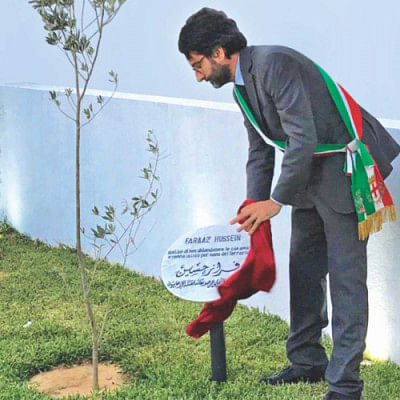Honouring a young hero

Without delving into the mystery of the virtue we call courage, we may perhaps say that courage is ubiquitous and is widely talked about and universally held in high regard. Sir Winston Churchill described courage as the "first of human qualities because it is the quality which guarantees all the others". Even Plato, ever the rationalist, suggested that courage is the ability to face your fear and "stand and fight". The courage to be is also the courage to step outside one's comfort zone—even in the face of fear, doubt, or alienation.
As long as the passage from youth to adulthood is measured by the mileposts of courage, the challenges of moral courage will continue to remain important and, to a great extent, attractive. It is in such a context that we need to recollect and gratefully remember the exemplary courageous act of Faraaz, a young Bangladeshi, during the infamous Holey Artisan Café attack of July 1, 2016. Without a doubt, Faraaz took risks on behalf of others, despite the possibility of dying or suffering serious physical consequences. We need to appreciate that his moral courage resulted in physical violence leading to death.
Faraaz's bravery and sacrifice are both saddening and inspirational. It is sad because in him we see an extraordinary young man whom we have lost but whose outstanding courage and fortitude makes us infinitely proud in the country and beyond. While feeling sorry and guilty for the horrendous acts of the zealots, we have stood tall and dignified owing to Faraaz's unprecedented moral courage and bravery.
Let us remember that Faraaz was not in the military, which trains individuals for physical courage. Significantly, there is nothing unusual in a medal winner telling an audience that he was "trained" to do what he did, or the sentiment expressed by medal recipients that anyone in their unit or platoon would have done the same thing if they were placed in the same situation. It is thus astounding as to how this young man displayed admirable military traits in such a frightening scenario.
Faraaz displayed love that does justice. It is the love that gives meaning and purpose to our lives. Mahatma Gandhi put it this way: "A coward is incapable of exhibiting love." Love, he writes, "is the prerogative of the brave". For Faraaz courage was perhaps an attachment, a yearning, a desire for something that extends beyond our radically autonomous selves.
Field Marshal William Slim says that "Courage is not merely a virtue; it is the virtue. Without it there are no other virtues. Faith, hope, charity, all the rest don't become virtues until it takes courage to exercise them. Courage is not only the basis of all virtues; it is its expression. True, you may be bad and brave, but can't be good without being brave".
Faraaz may have been in an emotional state that prompted him to risk death; he also staked his career, happiness, his whole future on his judgment of what he thought was right and worthwhile—quite clearly admirable moral courage.
We need to know that there are men in high positions who have had distinguished physical courage but lacked moral courage, and conversely there are morally courageous people who would not face bodily danger. Faraaz displayed both physical and moral courage and we need to appreciate that moral courage is higher and a rarer virtue than physical courage.
A society which dwarfs its men will find that with small men no great thing can really be accomplished. The Bangladeshi State that owes its creation to the supreme courage of Bangabandhu should not fail to honour one of its bravest sons by conferring, posthumously, the highest civilian award, may be the Swadhinata Padak (Independence Day Award), on Faraaz. We definitely long to live in a world where it is easier, not harder, to make tough moral choices. Finding ways to establish and enhance a culture of moral courage is surely one of the noblest goals of humanity.
Muhammad Nurul Huda is a former IGP and columnist of The Daily Star.

 For all latest news, follow The Daily Star's Google News channel.
For all latest news, follow The Daily Star's Google News channel. 



Comments